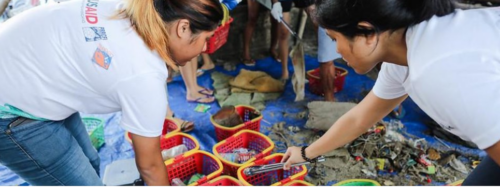Turning the Tide on Ocean Plastic Pollution in the Philippines

A staggering 2.7 million tons of plastic waste are generated in the Philippines each year, 20 percent of which is estimated to end up in the ocean (McKinsey, 2015). According to Dr. Jenna Jambeck’s 2015 ocean plastics study–one of the most comprehensive ocean plastics studies to date–the nation stands as the third largest global contributor to the eight million tons of plastics that are estimated to flood our oceans each year. Like many rapidly-urbanizing countries, the Philippines struggles with unsustainable plastic production and consumption and a waste management infrastructure that relies heavily on open dumping sites, giving plastics an easy path into waterways.
While national laws to guide solid waste management have been in place in the Philippines for years, responsibility to implement the law falls to local government units. Local governments, however, are often challenged by a lack of financial resources, limited capacity for enforcement, and low public awareness of the human and environmental cost of plastic waste. As addressing the country’s plastic problem becomes an increasingly pressing priority, more work is needed to establish and enforce legislation, enhance infrastructure, and encourage sustainable production and consumption. To address these challenges, USAID is supporting locally-driven solutions to turn the tide of plastic pollution. USAID takes pride in its partnership with the Philippines to reduce waste, develop new ways of reusing materials and increase recycling for healthier cities and seas.
Since 2016, USAID’s Municipal Waste Recycling Program (MWRP) has been working with grantees in the Philippines, Vietnam, Sri Lanka, and Indonesia to reduce land-based sources of ocean plastic pollution. In the Philippines, USAID has awarded nearly USD $1.5 million in grants and provided technical assistance to ten local organizations that are using novel approaches to improve solid waste management and increase recycling. MWRP’s pilot results have not only reduced ocean-bound plastic waste, but have created a range of additional benefits to make communities stronger, healthier, and more resilient. One of the program’s most recent grantees, the Philippine Reef & Rainforest Conservation Foundation, Inc., is piloting a zero-waste consumer goods model in convenience stores to shift away from 163 million lightweight, single-use plastic sachets that are used each day throughout the country (GAIA, 2019).
To expand on MWRP’s impact and learning, USAID launched its flagship program on ocean plastic pollution, Clean Cities, Blue Ocean (CCBO), in August 2019. CCBO works in rapidly-urbanizing areas around the globe to combat plastic pollution. In 2020, CCBO will launch its program in the Philippines and begin working with partners in three engagement sites—Manila Bay (via Las Piñas and Pasig Cities), Batangas Province and City, and Iloilo Province and City—to identify, test, and scale locally-driven solutions to promote the 3Rs (reduce, reuse, recycle) and enhance solid waste management systems. Batangas and Iloilo cities are USAID Philippines’ partners under the Cities Development Initiative of the Mission. The Philippines is one of the seven countries across Asia, Latin America, and the Caribbean where CCBO is active.
As part of CCBO’s efforts to identify global best practices and to implement and tailor local solutions to meet current, local challenges, the program will also tackle complications arising from COVID-19. Given that much personal protective equipment is plastic-based, it is crucial to ensure that municipalities and barangays in the Philippines have systems in place that allow communities to safely dispose of waste, recycle and repurpose plastic products to the greatest extent possible, and build more resilient waste systems that can quickly respond to natural disasters and public health events.
Through local solutions and collaboration, the Philippines can continue to reduce plastic waste and its impacts on our ocean, cities, and communities. CCBO is currently seeking local grantee partners and accepting concept papers from organizations in the Philippines that are interested in and qualified to implement locally-led solutions that support the program objectives. The next deadline for applications is July 30. Visit the CCBO Grants Program website to download the full Annual Program Statement and to learn how interested organizations can apply.
Sources
Jambeck, J.R., Andrady, A., Geyer, R., Narayan, R., Perryman, M., Siegler, T., Wilcox, C., Lavender Law, K., Plastic Waste Inputs from Land into the Ocean, Science, 2015.
Global Alliance for Incinerator Alternative (GAIA), Plastics Exposed: How Waste Assessments and Brand Audits are Helping Philippine Cities Fight Plastic Pollution, 2019.
McKinsey & Company and Ocean Conservancy, Stemming the Tide: Land-based Strategies for a Plastic-Free Ocean, 2015.

